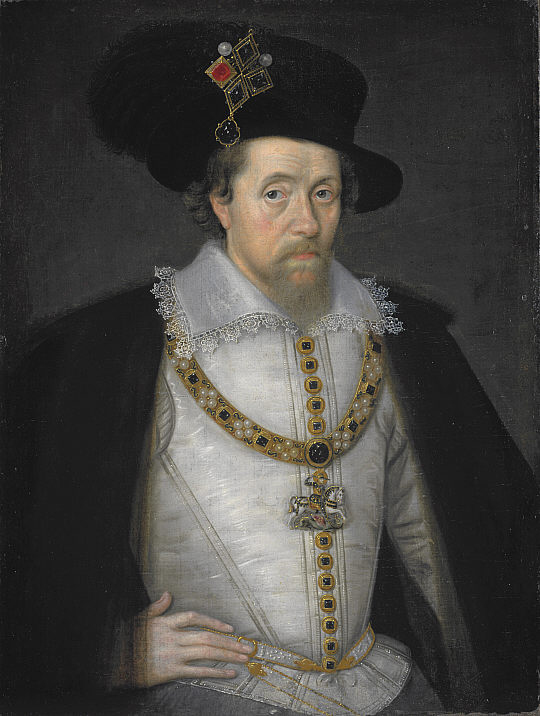
Macbeth And The Gunpowder Plot: Part 2
Macbeth is peppered with references to the gunpowder plot. Indeed, it seems to pay homage to King James I (pictured) and serve as a warning to anyone contemplating regicide. Clearly, Shakespeare was heavily influenced by the attempted treason.
Blurring Fact And Fiction in Macbeth
Like many of his plays, Shakespeare drew on historical fact to create his fiction. Macbeth centered around an eleventh century Scottish King, of the same name. The King Duncan, of the play is believed to represent James I. Interestingly, Shakespeare seems to have rewritten history, probably to flatter his patron. The real life Duncan was a weak and feeble ruler, a direct antithesis to the one we see on stage. Shakespeare presents him as heroic, divine even:
‘His silver skin laced with his golden blood’
(Act 2, Sc 3)
‘Besides, this Duncan
Hath borne his faculties so meek, hath been
So clear in his great office, that his virtues
Will plead like angels, trumpet-tongued’
(Act 1, Sc 7)
The fictional Macbeth is also very altered. In reality, Macbeth had a legitimate claim to the throne and was considered a ‘good King’. He had defeated (and killed) King Duncan in battle, not a shadowy murder plot. The Macbeth we see in the play is an ambitious murderer intent on usurping the divine right of Kings by stealing the throne. This must have garnered Shakespeare huge brownie points, as it fed directly into James’ own beliefs about divine right. The descent of the Macbeths into madness and death can be read as a stark reminder as to what happens if this is tampered with.
And then there’s Lady Macbeth’s advice to her husband to:
‘Look like the innocent flower, but be the serpent under it’
(Act 1, Sc 5)
Fantastic imagery, in its own right, but all the more fascinating when you consider the historical context. After the foiled attempt on his life, King James had a commemorative medal made… it featured the image of some flowers… with a serpent hiding amongst them. It is said to symbolise the deceit and treachery of the Jesuits (a Catholic faction). ‘Lady M’ is encouraging her husband to be duplicitous (read: like a Jesuit), a line which surely must have jumped out at King James and secured Shakespeare’s status as being onside with the King.
Finally, we come to a slightly confusing passage with the drunken porter. He waffles on about ‘equivocators’, a reference easily missed by a modern day audience:
‘Faith, here’s an equivocator, that could
swear in both the scales against either scale;
who committed treason enough for God’s sake,
yet could not equivocate to heaven; O, come
in, equivocator.’
(Act 2, Sc 3)
The Collins Dictionary explains the term in the following way: ‘When someone equivocates, they deliberately use vague language in order to deceive people or avoid speaking the truth’. The Porter’s ‘equivocator’ is Henry Garnet, a Jesuit priest, who had perjured himself over his knowledge of the gunpowder plot. At first he denied knowing anything. Ultimately, however, he confessed the truth, but argued that he hadn’t perjured himself as he’d lied, for the sake of god. Thus he was named ‘the great equivocator’… and hung.
We can never know Shakespeare’s true motives for colouring the play as he did. Perhaps it was simply to curry favour with his patron. Perhaps it was to distance himself from his Catholic heritage and uncomfortable connection to the conspirators. Perhaps we will never know. It is tantalising to imagine a night in ‘The Mermaid’ Tavern, though, dimly lit, with the smells of Cheapside mingling with the aroma of stale beer; In one corner sit a group of shadowy figures, huddled close, whispering treason into their ale. In another sits a man with quill in hand, scribbling furiously into the night.
Sources:
British Library
BBC Bitesize
Shakespeare Online
Historytoday.com
Collins English Dictionary
You can read Part 1 on the link between Shakespeare and the Gunpowder plot by clicking on the link here.
